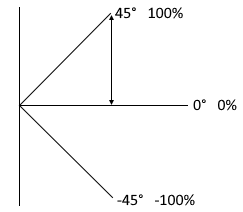Angle Degrees to Percent Calculator
Calculator and formula to convert angle degrees to percent and vice versa
Angle-Percent Converter
Angle-Percent conversion
Convert angles in degrees to percent (slope) or vice versa. The percentage represents the slope of a line.
Slope visualization

Slope properties
Percentage = slope: ratio of rise to run
Common conversions
| Degrees | Percent | Description |
|---|---|---|
| 0° | 0% | Horizontal |
| 30° | 57.7% | Moderate slope |
| 45° | 100% | Equal rise/run |
| 60° | 173.2% | Steep slope |
| 90° | ∞ | Vertical |
Range: -90° < angle < +90°
Slope: Percent = tan(angle) × 100
|
|
Understanding angle-percent conversion
The angle-percent relationship describes the slope or gradient of a line:
- Percent as slope: Rise divided by run, expressed as percentage
- Tangent function: tan(angle) = opposite/adjacent = rise/run
- 45° = 100%: Rise equals run (1:1 ratio)
- Values > 100%: Angle > 45°, steep slopes
- Road grades: 10% = 5.7° (common road slope)
- Practical limit: tan(90°) → ∞ (vertical line)
Conversion formulas
Degrees to Percent
Uses tangent function to calculate slope percentage
Percent to Degrees
Uses inverse tangent (arctan) to get angle
Slope definition
Basic definition of slope or gradient
Relation to tangent
Tangent connects angle to slope ratio
Calculation examples
Example 1: Degrees to Percent
Given: Angle = 30°
Find: Slope in percent
Result: 30° corresponds to 57.7% slope
Example 2: Percent to Degrees
Given: Slope = 100%
Find: Angle in degrees
Result: 100% slope corresponds to 45°
Example 3: Road grade
Given: Road grade = 10%
Find: Angle of incline
Result: 10% grade = 5.71° angle
Example 4: Steep slope
Given: Angle = 60°
Find: Slope percentage
Result: 60° is a very steep 173.2% slope
Geometric interpretation
The trigonometric relationship between angles and slopes:
Right triangle basis
- Slope forms right triangle with horizontal
- Tangent = opposite/adjacent sides
- Angle determines steepness
- Percent expresses ratio as percentage
Practical measurements
- Road grades: typically 0-15% (0-8.5°)
- Roof pitches: often 20-50% (11-27°)
- Mountain slopes: can exceed 100%
- Accessibility ramps: max 8.3% (4.8°)
Applications of angle-percent conversion
Angle-percent calculations are essential in many practical fields:
Civil Engineering
- Road and highway design
- Railroad track gradients
- Drainage and sewer slopes
- Accessibility ramp specifications
Architecture & Construction
- Roof pitch calculations
- Staircase design
- Foundation grading
- Water runoff management
Sports & Recreation
- Ski slope classifications
- Cycling hill categories
- Running track banking
- Skateboard ramp design
Surveying & Navigation
- Topographic map interpretation
- Land surveying and leveling
- Terrain analysis
- GPS elevation calculations
Mathematical foundations
The trigonometric basis of angle-percent conversion:
Tangent function
- Periodic with period π (180°)
- Range: (-∞, +∞)
- Undefined at ±90° (vertical asymptotes)
- Derivative: sec²(x)
Inverse tangent (arctan)
- Principal range: (-90°, +90°)
- Domain: all real numbers
- Continuous and monotonic
- Derivative: 1/(1 + x²)
Angle-percent conversion: bridging geometry and measurement
The angle-percent relationship elegantly connects abstract geometric angles with practical slope measurements. Through the tangent function, this conversion transforms angular measures into intuitive percentage expressions of steepness. From road engineering to architectural design, this fundamental trigonometric relationship enables precise quantification of inclines in everyday applications.
The power of trigonometric conversion
The angle-percent formula reveals key mathematical principles:
- Tangent function: Natural bridge between angles and ratios
- Percent as slope: Intuitive expression of steepness (rise/run × 100)
- 45° = 100%: Critical point where rise equals run
- Range limitation: Meaningful for angles between -90° and +90°
- Asymptotic behavior: Approaches infinity as angle approaches ±90°
- Practical utility: Converts abstract angles to measurable gradients
Summary
Angle-percent conversion demonstrates the practical power of trigonometry. The elegant formulas — tan(angle) × 100 for degrees to percent, and arctan(percent/100) for percent to degrees — transform theoretical geometry into everyday measurements. Whether designing roads, calculating roof pitches, or analyzing terrain, this fundamental relationship makes abstract angles tangible. It reminds us that mathematics bridges the gap between pure theory and practical application, turning geometric concepts into tools for engineering and design.
|
|
|
|